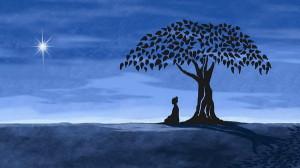Shakyamuni’s Enlightenment & Ours
by Devin Seigaku Amato
As Jodo-E, or Bodhi Day is on December 8th, I would like to talk about the story of Shakyamuni’s enlightenment and what it is that this enlightenment means. First briefly I would like to share the story of Buddha’s practice.
Shakyamuni Buddha, realizing the transience of life, and the inevitability of suffering at all stages of our life decided to search for a way out. A way out of the suffering that comes from sickness, old age, and death. As Buddha was a prince he had all that he needed and more, yet suffering followed each step he took. Because abundance and the satisfaction of bodily desire was not the way he naturally would look to the opposite path. He practiced every type of asceticism, yoga, meditation technique, and starvation. Deprivation of the body’s comfort was not the way out either.
Shakyamuni was weak and tired. Seeing his condition, a young girl named Sujata was passing by and offered Buddha a bowl of rice porridge. Regaining his strength Shakyamuni decided to give yet another try to finding the way out of our suffering. He practiced sitting meditation under the Bodhi tree and vowed not to move from this spot until he attained enlightenment.
The Buddha experienced severe self doubt, temptation to return to his life at the palace. To be with his wife and son. To enjoy life’s comforts and forget this journey. He experienced false enlightenments and offered deals with himself to end this sitting. I will say from my experience we all go through this when we make the resolution to sit still. Our instincts are to move away from physical pain and boredom. To fidget and fuss.
For Buddha when the morning star rose on December 8th he had found the answer to dealing with life’s suffering. In looking for a way out of the suffering of life we create more suffering. The Buddha saw the interdependence of all things and the emptiness of an unchanging, independent self. Human beings create suffering from the 12 link chain of causation, or dependent origination. This is essentially the realization that because of this, so then there is this.
Ignorance to the 4 noble truths, 8-fold path, and the nature of the emptiness of all things leads to the producing of karma, or action of body speech and mind. This habitual energy in turn leeds to consciousnesses. Through the senses of sight, sound, smell, taste, touch, and mental formation we have the six sense objects that lead to our eyes ears nose tongue body and mind.
The interplay of our senses and their objects determine our likes and dislikes that in turn create craving for pleasurable experiences and distance from displeasurable experiences. This all creates an understanding, or an experience of the false notion of an independent me that exists apart from everything out there. From previous habit energy, or karma we are born into the physical world and are subject to suffering old age and death. This repeats and we have a wheel of samsara, or suffering that continues to roll over and over and over.
Buddha found the way out of this by the direct experience of the emptiness of the self. By understanding the existence of suffering, the cause, the elimination of desire and the means to end it with the 8-fold path, being right action, speech, livelihood, effort, meditation, view, intention, and concentration.
So what does Shakyamuni’s enlightenment mean in our daily life. For each one of us there is a true nature that manifests in our daily life. A Buddha’s activity is not limited to meditation, chanting, and precepts. Enlightenment is found in feeding and caring for our children. Changing diapers, cooking meals, doing the dishes. Cleaning up after our messes and the messes of others. In understanding the interdependence of all life as a limitless vast ocean of time and space.
We are individual drops of water that exist briefly and join with the infinitely large body of water that is Buddha. The very way out of suffering is to understand that within our suffering we can find peace. There is no other time or place that we can find peace. Acceptance of our life and circumstances is the first step on walking in the footsteps of Buddha.
I would like to add that this isn’t a 1 and done remedy to suffering. We have to continually embrace the suffering of our lives moment by moment. It isn’t done until we are. We do the dishes and put them away, only to take them out and dirty them again at the next meal. Life’s work is never finished. The activity of acceptance is never finished. Shakyamuni Buddha continued to sit, practice, beg, and embody the very activity that he found his peace in. He did not find peace and say oh, ok… I can go home now and suffering is done.
My hope is that each one of us will manifest our Buddha nature in our very place. In our very lives. That we will work to weave the peace we find in our life into the lives of others. That we will see the interdependent nature of all life. If he falls so does she. If she suffers, so does he. No one can be left behind. Each of us has a unique ability to help ease the suffering of someone else. Something small can have a huge effect on someones life. Because of that, so we have this.
All our lives have been transformed by one man sitting down under a tree and trying to understand why it is all so hard.
Devin Seigaku Amato is a Soto Zen Buddhist unsui, a clouds-and-water priest, a student of Sensei Gyokei Yukinori Yokoyama.














